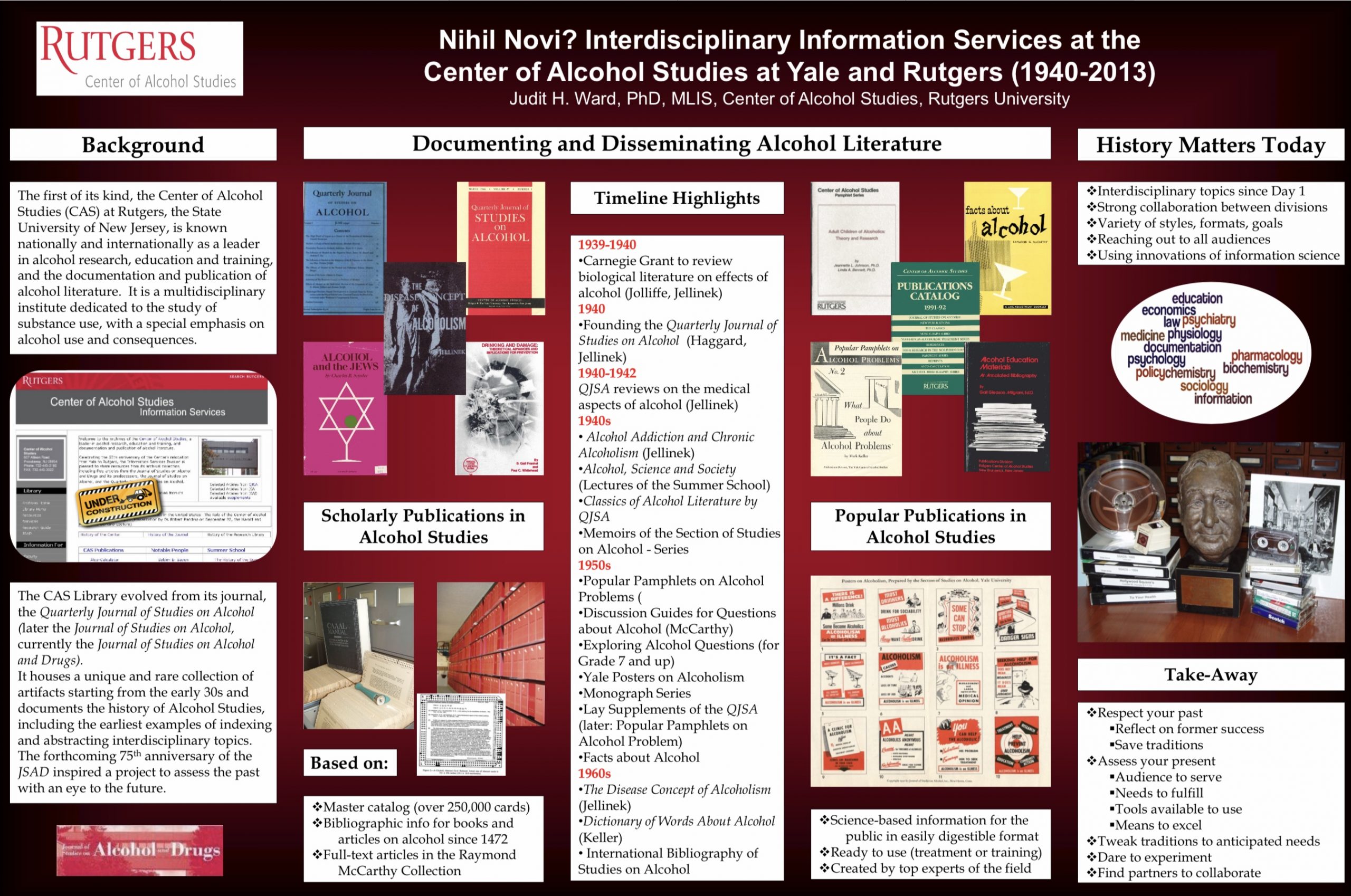[Poster presented at the Medical Library Association Conference, May 5-9, 2013, Boston]
Objectives: To explore and document how a revolutionary special library information system designed in the 1940s to disseminate knowledge on an evolving new field, Alcohol studies managed to keep current and remain influential throughout decades by embracing change, adopting technology, and pioneering new ways of reaching diverse audiences as vital part of a leader multidisciplinary institute in the field.
Methods: Relying heavily on primary sources from the Center of Alcohol Studies (CAS) archives, this study aims at locating and interpreting documents to recapture the nuances of inception of the CAS special library information system. It wishes to demonstrate that with its novel methods of organizing and disseminating information , including the publication of the first scholarly journal on alcohol-related problems in the United States, the information services division has been one of the five crucial components of CAS (founded at Yale University, then moved to Rutgers University) ever since. The research expects to discover some key elements in applying innovations of information science to an evolving interdisciplinary field in the past 7 decades. Identifying the original components as well as tracking their trajectories over time will yield invaluable knowledge in terms of practical applications translatable for the 21st century health libraries.
Results: The Information Division at CAS, in preparation for the 75th anniversary of the Journal of Studies on Alcohol and Drugs, also published here, revived the past by reviewing, selecting, and digitizing material from its archives for 2 years. Locating and interpreting documents resulted in unexpected outcomes leading the research to new directions during the process. Among the unrevealed treasures are the original Jellinek curve, from which the more popular version evolved; the prototype of the alcometer and alco-calculator, the father of alcohol testing; and an episode from Hollywood Squares, sponsored by CAS, with a discussion guide for educational purposes. Preserving and digitizing material related to the birth of the science of alcohol studies also shed light on the merits of an early model of organizing information in a multidisciplinary field, the Classified Abstract Archive of the Alcohol Literature (CAAAL). CAAAL is a collection of approximately 20,000 abstracts prepared by CAS staff from 1939 through 1977 of the scientific and scholarly alcohol literature, including scholarly articles, monographs and their chapters, and published and unpublished reports, all searchable by subject using a needle-sort method. Its highly regarded methodology of indexing and abstracting alcohol studies became crucial to the field and is worth sharing.
Conclusions: The poster presents the journey in time and space of current and past library staff to preserve and share the wealth of knowledge gathered over the years in the form of a modern digital archival collection. It also points out our responsibilities, not only in the preservation of historical material, but also in the organization of the information accumulated from conscious and accidental collection development and in providing access to praiseworthy items, methods, and collections, which might also serve as examples to follow in other interdisciplinary fields.
Ward, J. H. (2013). Nihil novi? Interdisciplinary information services at the Center of Alcohol Studies at Yale and Rutgers (1940-2013). In Mitchell, N. (2014). Proceedings, 113th Annual Meeting, Medical Library Association, Inc., Boston, MA. Journal of the Medical Library Association: JMLA, 102(1), E1. #198. P. 107
